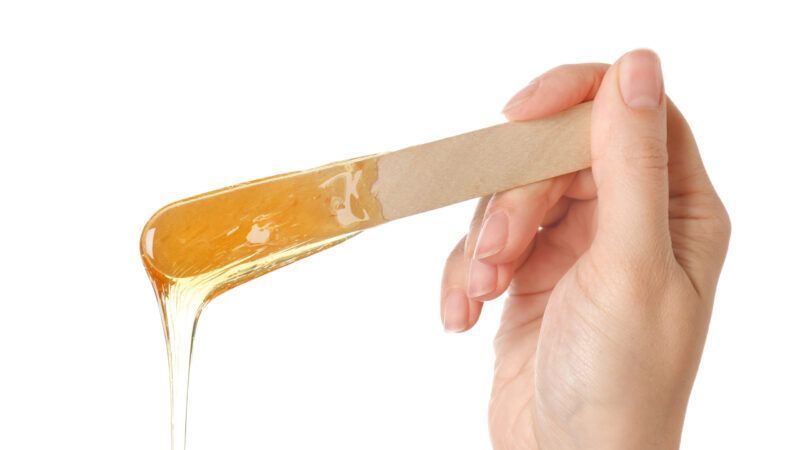Kansas Thinks You Need 1,000 Hours of Training To Remove Hair
Bryn Green wants to start a sugaring business, but the state’s occupational licensing regime requires her to spend thousands on irrelevant training. Now she's suing.

Bryn Green of Hays, Kansas, has a 16-month-old son and a dream of starting a business that'll give her the flexibility to care for him.
For the past few years, Green has received sugaring services—a noninvasive, nonhazardous hair removal procedure that involves applying a sugar, water, and lemon juice paste to a client's skin. A sugaring business, she thought, could be "something that I could do part time" or on "a super flexible schedule that would allow me to stay home with my son and also provide some additional income for our family," Green tells Reason.
But Green quickly learned that it's illegal to remove a single hair from a client as a sugarer without a state-issued occupational license.
Green is now suing the Kansas Board of Cosmetology for the right to sugar without a license, represented by the Kansas Justice Institute, a public-interest litigation center. "The state of Kansas has unreasonable occupational licensing requirements," says Samuel G. MacRoberts, general counsel and litigation director for the Kansas Justice Institute. "They are burdensome, oppressive, they're protectionist, and the Kansas Constitution prevents the government from imposing that type of licensing regime for sugaring and for Bryn Green."
Green could either obtain an esthetician or cosmetology license to legally offer sugaring services. Getting an esthetician license, while less time-intensive at 1,000 required education hours, would mean driving two and a half hours each way to the closest approved school in Wichita. Getting a cosmetology license would be possible through a school in Hays, but Green would need to pay $18,200 in tuition. Worse, the cosmetology license requires 1,500 education hours.
The vast majority of that curriculum is completely unrelated to sugaring. "If you look at the curriculum for specifically a cosmetology license," only "a small percentage of it is temporary hair removal," says Green. "If you divide the 1,500-hour requirement out, it ends up being less than 1 percent." In order to be licensed, Green would also need to pass written exams that require no practical demonstration of skills.
Those requirements illustrate that occupational licensing regimes are often more concerned with protecting incumbents and limiting competition than with consumer safety. Sugaring is "extremely safe" and "extremely natural," Green explains. "You can sugar on yourself at home. You can purchase sugaring paste over the counter."
"The government oftentimes tries justifying their occupational licensing regimes on the argument that it benefits public welfare," explains MacRoberts. "But in this case, when the cosmetology regime requires less than 1 percent devoted to the business that Bryn wants to do on a daily basis, it is patently unconstitutional." The Kansas Constitution, MacRoberts notes, "has a unique provision called the Life, Liberty, and Pursuit of Happiness Clause," and by preventing Green from exercising her right to make a living through sugaring, the state's occupational licensing regime violates that clause.
The Institute for Justice (I.J.), a libertarian public-interest law firm, ranked Kansas 40th in the nation for its average licensing burdens in its 2022 License To Work report, a national occupational licensing study. Despite being a relatively low-burden state, Kansas still requires nearly one in five workers to get an occupational license to legally perform their jobs. I.J. estimates that occupational licensing "costs the state's economy $3.1 billion and leads to 29,400 fewer jobs each year."
"If we're successful in this case," says MacRoberts, "the Life, Liberty, and Pursuit of Happiness Clause will be applied to a great number of occupations in Kansas in a way that promotes individual liberty and freedom."


Show Comments (25)